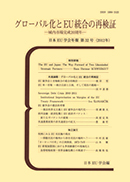2012 巻, 32 号
選択された号の論文の10件中1~10を表示しています
- |<
- <
- 1
- >
- >|
グローバル化とEU統合の再検証
特別寄稿
-
2012 年 2012 巻 32 号 p. 1-17
発行日: 2012/06/10
公開日: 2014/06/10
PDF形式でダウンロード (529K)
共通論題:グローバル化とEU統合の再検証
-
2012 年 2012 巻 32 号 p. 18-28
発行日: 2012/06/10
公開日: 2014/06/10
PDF形式でダウンロード (731K) -
2012 年 2012 巻 32 号 p. 29-52
発行日: 2012/06/10
公開日: 2014/06/10
PDF形式でダウンロード (997K) -
2012 年 2012 巻 32 号 p. 53-64
発行日: 2012/06/10
公開日: 2014/06/10
PDF形式でダウンロード (510K) -
2012 年 2012 巻 32 号 p. 65-91
発行日: 2012/06/10
公開日: 2014/06/10
PDF形式でダウンロード (872K) -
2012 年 2012 巻 32 号 p. 92-114
発行日: 2012/06/10
公開日: 2014/06/10
PDF形式でダウンロード (1064K) -
2012 年 2012 巻 32 号 p. 115-134
発行日: 2012/06/10
公開日: 2014/06/10
PDF形式でダウンロード (910K)
独立論文
-
2012 年 2012 巻 32 号 p. 135-157
発行日: 2012/06/10
公開日: 2014/06/10
PDF形式でダウンロード (847K) -
2012 年 2012 巻 32 号 p. 158-177
発行日: 2012/06/10
公開日: 2014/06/10
PDF形式でダウンロード (835K) -
2012 年 2012 巻 32 号 p. 178-201
発行日: 2012/06/10
公開日: 2014/06/10
PDF形式でダウンロード (1050K)
- |<
- <
- 1
- >
- >|
